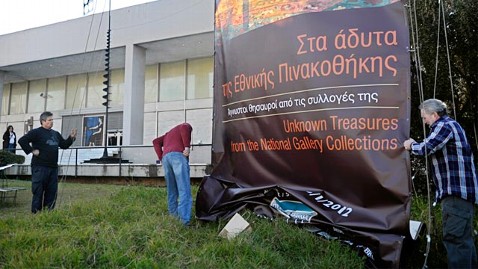Picasso Works Stolen From Greece's Largest Art Museum

Image Credit: Louisa Gouliamaki/AFP/Getty Images
ABC News' Carlos Boettcher reports:
Thieves executed a brazen early-morning burglary of Greece's largest art museum Monday, making off with three works, including one by the 20th-century master Pablo Picasso.
The burglars were able to take advantage of the National Art Gallery's soft security, which was short-staffed because of striking workers, officials said.
Greece, beset by riots, strikes and economic pressure, has had to make numerous cuts in the public sector, including museum security.
The heist was successful thanks to a combination of planning, patience and timing, officials said. Alarms were intentionally set off numerous times Sunday, leading the guards to disable at least one of the alarms, providing the thieves easy entrance through a balcony door.
With the alarm disabled, the thieves entered the museum and worked quickly, stripping paintings from their frames and absconding with the cubist female bust by Picasso, a 1949 gift to Greece in memory of World War II.
They also took an oil painting by the Spanish artist, an oil painting by 20th-century master Piet Mondrian and a pen-and-ink drawing by Italian 16th-century painter Guglielmo Caccia, officials said.
An attempt to steal a fourth work - also by Mondrian - was abandoned after a sensor was triggered in an exhibition space, bringing the attention of the guard. The guard saw only the back of a man running away, with no further identification or clues on the thieves.
The heist reportedly took no longer than 7 minutes. Museum officials were unable to estimate the total cost of the stolen works. Art thieves regularly target Picassos because of the extreme value and cachet of the works.
Since 2006, five Picassos have been stolen from museums around the world, including a 2010 burglary in Paris where more than $120 million worth of art was stolen overnight.
Less than 10 percent of stolen art is ever recovered and authorities know little about what exactly happens to such works after the theft. The value on the paintings is so great that cash transactions are unwieldy if not impossible.
Despite the Hollywood image of Swiss bank transactions and numbered accounts, it is assumed that much stolen art is used as collateral in other criminal enterprises. Shipments of drugs or weapons can be secured using stolen art, a marker more valuable than any casino chip.
Greek police are continuing their investigation. The museum will remain closed for refurbishment; it is unclear whether the security will be upgraded as well.
The Associated Press contributed to this article.